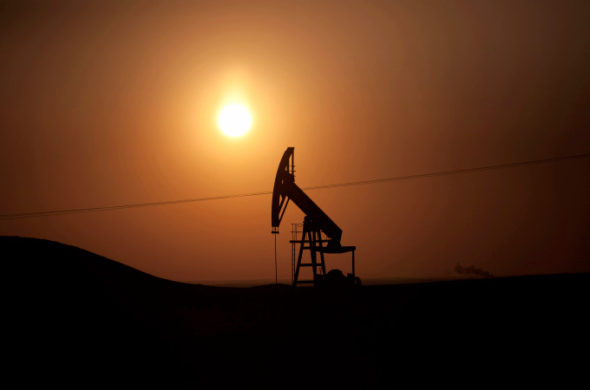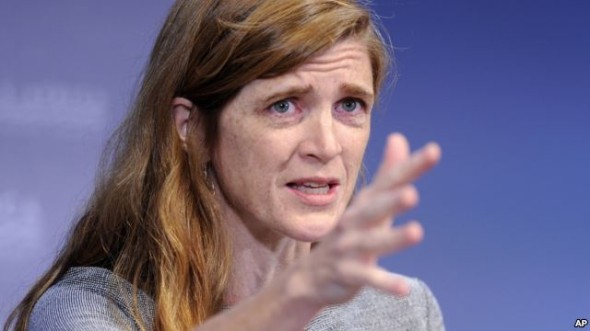US-led airstrikes damage ISIS-held oil fields in Syria
Daily News Article — Posted on September 26, 2014
(by Geoff Earle, NY Post) WASHINGTON – In a new phase of air strikes, the US and Arab allies took out ISIS-controlled oil refineries in an effort to choke off ISIS’ revenue stream. [The U.S. has been conducting air raids against the group in neighboring Iraq for more than a month.]
Military officials said the strikes, undertaken on the third day of an air campaign, took out 12 small ISIS-controlled oil refineries in eastern Syria.
 [ISIS captured most of Syria’s largest oil fields earlier this year and is believed to be partly funding its operations by smuggling oil out and selling it on the black market.] The terrorist organization uses oil and gas as a major revenue stream…, banking an estimated $1 million to $2 million a day. Other funding sources include ransoms from kidnapping and looting of captured banks.
[ISIS captured most of Syria’s largest oil fields earlier this year and is believed to be partly funding its operations by smuggling oil out and selling it on the black market.] The terrorist organization uses oil and gas as a major revenue stream…, banking an estimated $1 million to $2 million a day. Other funding sources include ransoms from kidnapping and looting of captured banks.
According to the Britain-based Syrian Observatory for Human Rights, at least four oil installations and three oil fields were hit around the town of eastern Syrian town of Mayadeen.
“We are still assessing the outcome of the attack on the refineries, but have initial indications that the strikes were successful,” said US Central Command said in a statement.
“These small-scale refineries provided fuel to run ISIL operations, money to finance their continued attacks … and an economic asset to support their future operations.”
ISIS is known to pay its soldiers, and knocking out its revenue stream is one way to disrupt its recruiting.

An oil field near the town of Deriq, Syria. The Islamic State group is believed to control 11 oil fields in Iraq and Syria and to earn more than $3 million a day from oil smuggling, theft and extortion. (Photo: AP)
US Central Command says ISIS produces 300 to 500 barrels of refined petroleum each day. It sells oil on the black market at cut-rate prices.
US Ambassador to the United Nations Samantha Power said Thursday Syrian President Bashar al-Assad’s government got nothing more than a head’s up about impending US-led airstrikes on ISIS in Syria this week because of his government’ cruel behavior toward its people.
“You’re committing terror against your people, you’re the ones using chemical weapons and barrel bombs, etc. So we didn’t ask for permission — we just offered a notification,” she told the “Today Show” on Thursday.
She said Syria itself is not a “reliable partner” in the international effort against ISIS, although some skeptics have noted Assad’s regime could benefit from the attacks.
“There was no way to defend the country of Iraq, the people of Iraq, our interests in the region, without going into Syria,” she said.
Speaking a day after President Obama vowed to crush the ISIS “network of death,” Power, in a separate interview with MSNBC indicated Turkey could be coming into the fold.
The NATO ally was noticeably absent from the coalition of five Arab nations that joined the US in launching airstrikes, after just days ago winning the release of 49 hostages held by ISIS thugs.
“I mean, the message [from Turkey] to us this week is now, ‘We got our hostages. Talk to us. What are the requirements? How can we contribute?,” she said. Speaking of Turkey’s interests, she said: “They have more than a million [Syrian] people inside their border already. Hundreds of thousands more who could follow because of ISIL’s role in northern Syria.”

U.S. Ambassador to the U.N. Samantha Power speaks during the Civil Society Forum as part of the 2014 U.S. Africa Summit in Washington, Aug. 4, 2014. (VOA News)
Following the brutal murder of a French mountain climber by an ISIS-linked group in Morocco, Power predicted that France’s resolve would only be steeled. The nation has already taken part in air strikes over Iraq but not in Syria.
“What you heard was far from cowing in the face of what ISIL had said,” she said, using another name for the group. “President [Francois] Hollande said we will not be deterred, this just shows why we have to defeat ISIL.”
She compared the overall effort to the decade-long campaign against Al Qaeda. “What we are doing is engaging the campaign to degrade and ultimately destroy this monstrous group,” she said in the “Today” interview. “To the extent we’ve been at war with Al Qaeda over these many years, that is the kind of effort you will see against this over time.”
Questions
1. List the Islamic State’s funding sources.
2. For what purposes does ISIS use the money?
3. How many oil refineries, oil installations and oil fields did the U.S. hit in these first strikes with our Arab allies in eastern Syria?
4. a) What does US Ambassador to the UN Samantha Power give as the reason for U.S. strikes in Syria?
b) Does this sound like a government determined to destroy ISIS? What other reason should Ambassador Power be giving for our strikes in Syria?
5. a) How many countries are in the Arab League?
b) According to President Obama and the Pentagon, five countries — Bahrain, Jordan, Saudi Arabia, Qatar, and the United Arab Emirates — joined the United States in Wednesday night’s airstrikes in Syria. Obama says the coalition shows that “people and governments in the Middle East are rejecting ISIL and standing up [for] peace and security.”
Do you agree with this assertion? Explain your answer.
Ask a parent the same question.
6. Turkey borders both Iraq and Syria. It is also a member of NATO.
a) What is the role of NATO? (See “Background” for the answer.)
b) What type of support should Turkey give the U.S. in our attempts to “decimate” ISIS?
7. CNN reported Thursday:
The United States and its allies are steeling themselves for what an American defense official described Thursday as a years-long fight against the so-called Islamic State. “I think we are in this for a matter of years," the Pentagon spokesman, Navy Rear Adm. John Kirby, told CNN Thursday. "... We are steeling ourselves for that period of time."
U.S.-led airstrikes hit locations overnight in a remote area of eastern Syria where ISIS has been using mobile refineries to produce oil that brings in up to $2 million a day for the group.
The U.S. military was still assessing the damage to the refineries by the airstrikes, Kirby said. The attacks are focused on the "infrastructure around the refineries," meaning the ability of ISIS to produce oil, he said.
Even so, there are questions about just how much impact the destruction of the refineries will have on ISIS, which analysts have said has access to billions of dollars. "Even if we stop their oil flow today, they still have about a billion dollars in the bank," retired U.S. Army Col. Peter Mansoor said.
"They seized about a third of a billion dollars from the central bank of Mosul (Iraq)." On top of that, he added, ISIS has garnered millions of dollars in ransoms from European governments for hostages and have traded much of their oil.
For now, the United States is focused on the refineries, according to Kirby. But he acknowledged there are "other economic levers the international community is going to have to pull" to cut off all funding to ISIS.
Ask a parent - is there a different/stronger policy/strategy we could pursue to destroy ISIS more than the action we are taking now? Explain your answer.
Background
- Countries that border Iraq: Iran, Jordan, Kuwait, Saudi Arabia, Syria, Turkey
- Countries that border Syria: Iraq, Israel, Jordan, Lebanon, Turkey
NATO: Role and member states:
The fundamental role of NATO is to safeguard the freedom and security of its member countries by political and military means.
In 1949, there were 12 founding members of the Alliance:
Belgium, Canada, Denmark, France, Iceland, Italy, Luxembourg, the Netherlands, Norway, Portugal, the United Kingdom and the United States. The other member countries are: Greece and Turkey (1952), Germany (1955), Spain (1982), the Czech Republic, Hungary and Poland (1999), Bulgaria, Estonia, Latvia, Lithuania, Romania, Slovakia, Slovenia (2004), and Albania and Croatia
THE ARAB LEAGUE: Goal and member states:
 The Arab League is a regional organization of Arab countries in and around North Africa, the Horn of Africa, and Southwest Asia.
The Arab League is a regional organization of Arab countries in and around North Africa, the Horn of Africa, and Southwest Asia.
The Arab League was established in 1945. It has 22 members: Algeria, Bahrain, Comoros, Djibouti, Egypt, Iraq, Jordan, Kuwait, Lebanon, Libya, Mauritania, Morocco, Oman, Palestine, Qatar, Saudi Arabia, Somalia, Sudan, Syria, Tunisia, United Arab Emirates, and Yemen. [Syria's participation has been suspended since November 2011, as a consequence of government repression during the ongoing uprising and civil war.]
The League's main goal is to "draw closer the relations between member States and co-ordinate collaboration between them, to safeguard their independence and sovereignty, and to consider in a general way the affairs and interests of the Arab countries."
